Key takeaways
- The Emancipation Proclamation marked a pivotal shift in the Civil War, transforming the war’s purpose from preserving the Union to advocating for human liberty.
- Despite its limitations, it set the stage for future amendments and civil rights movements, illustrating how moral courage can influence political landscapes.
- Modern interpretations of the Proclamation highlight ongoing debates around race and justice, showing its lasting impact on contemporary discussions about equality.
- The document emphasizes the need for persistent commitment to social justice and the application of its principles to current issues like systemic inequality and civil rights.
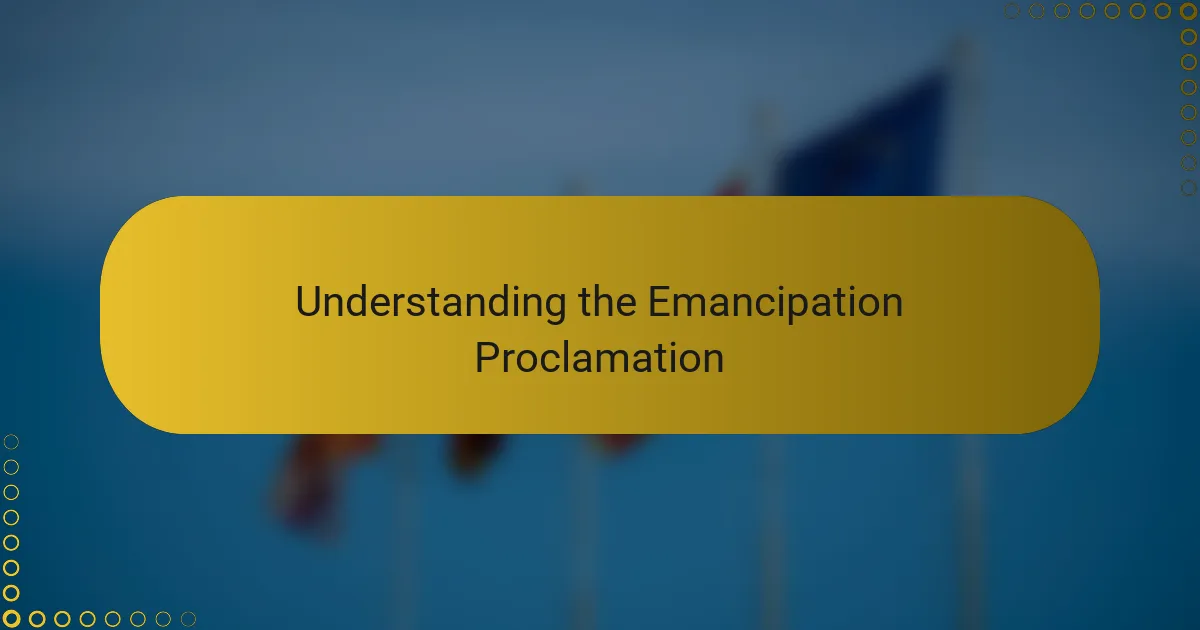
Understanding the Emancipation Proclamation
When I first dove into the Emancipation Proclamation, I was struck by its dual nature—it was both a powerful moral statement and a strategic war measure. Have you ever wondered how something so monumental was actually limited in scope? It only applied to the Confederate states still in rebellion, not the border states or places already under Union control.
This legal nuance made me reflect on the complexity of change. It wasn’t an immediate freedom for all enslaved people but a decisive step that reshaped the war’s purpose. I think about how difficult it must have been for Lincoln to balance political pressures with a deep personal conviction against slavery.
Understanding the Proclamation means recognizing it as a turning point that redefined the fight for the Union. It shifted the narrative from preserving the nation to embracing human liberty. Isn’t it fascinating how a single document can carry such weight, yet also leave so much room for continued struggle ahead?
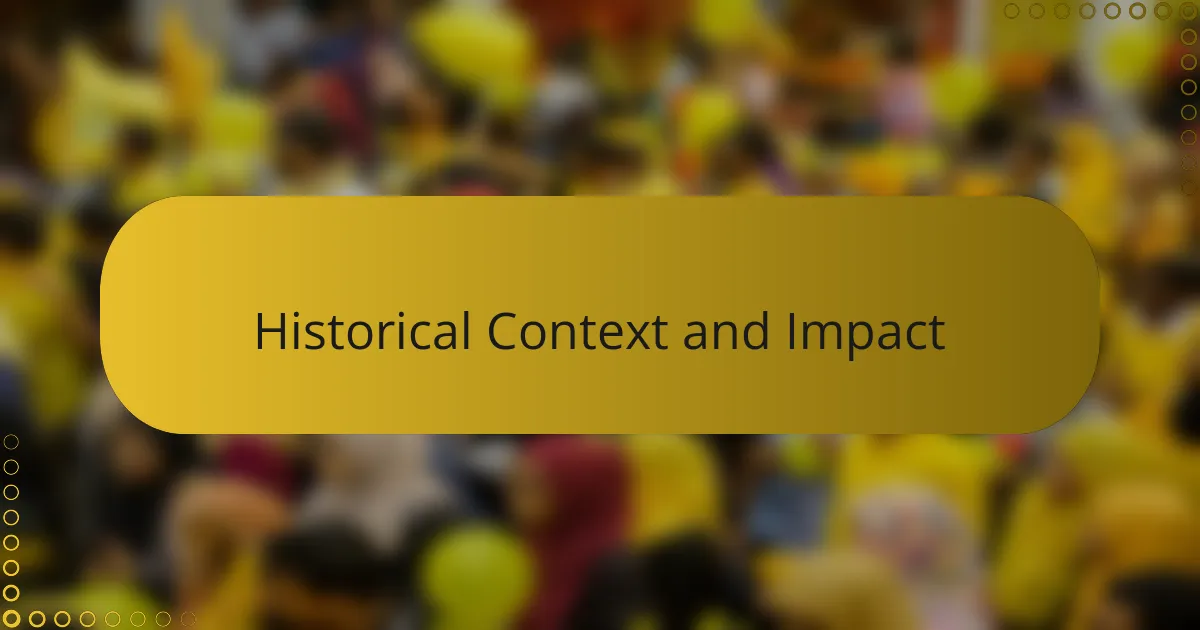
Historical Context and Impact
The Emancipation Proclamation came at a time when the United States was tearing itself apart in civil war. Knowing this, I often wonder what it must have been like for Lincoln to issue such a bold statement amid so much uncertainty and bloodshed. This wasn’t just a document; it was a gamble on the future of the nation and the very idea of freedom.
What strikes me is how the Proclamation’s impact rippled far beyond its written words. While it freed slaves in rebellious states, it also transformed the purpose of the war, making abolition an official Union goal. I see this moment as a catalyst that gave hope to millions while also hardening the resolve of those fighting against slavery.
Reflecting on its historical context, I realize how the Emancipation Proclamation set the stage for the 13th Amendment and civil rights battles that followed. It was imperfect and limited, yet it cracked open the door to justice in a way that still resonates today. Isn’t it incredible how one executive order could alter the course of history so profoundly?
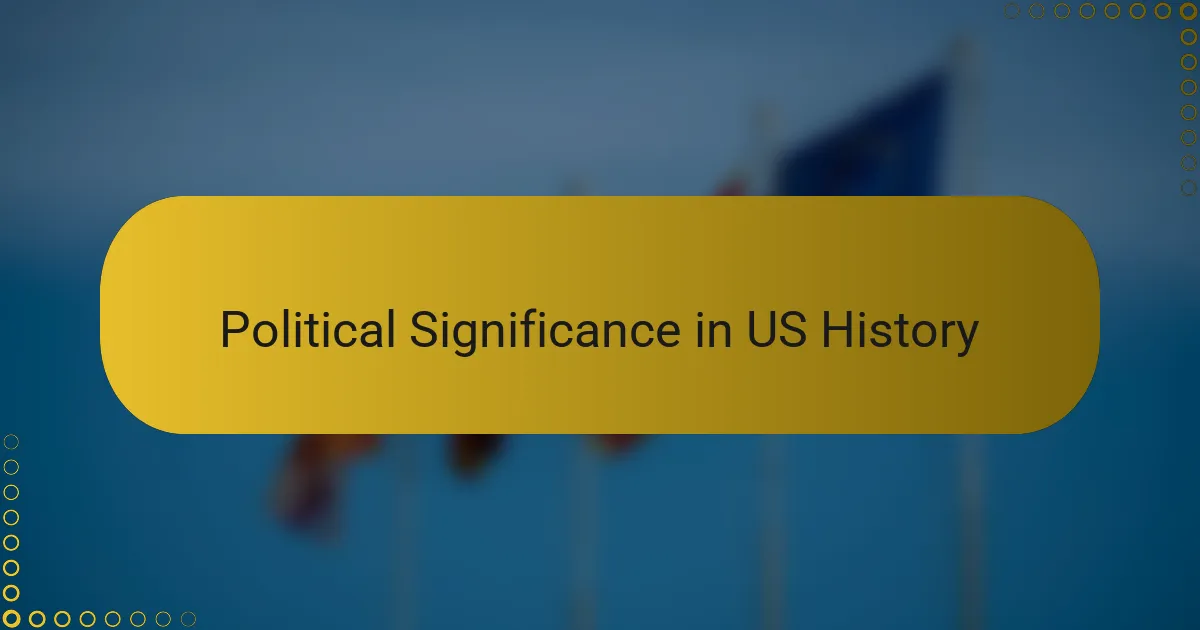
Political Significance in US History
The Emancipation Proclamation wasn’t just a wartime decree—it was a seismic political move that reshaped the very identity of the United States. When I think about its significance, I see how it redefined the Union’s purpose, turning a conflict about preserving territory into a crusade for human freedom. Can you imagine the political courage it took for Lincoln to link the war effort so directly with abolition, especially when public opinion was so divided?
What fascinates me is how the Proclamation influenced the political landscape beyond the battlefield. It helped prevent foreign powers like Britain and France from siding with the Confederacy by framing the war as a moral imperative, not just a political dispute. From my perspective, this clever strategic layer shows how deeply intertwined politics and morality were in that era.
Even now, the Proclamation’s political legacy echoes through American history. It laid the groundwork for constitutional changes and civil rights movements, signaling that government could and should be an agent of social justice. Don’t you find it striking how a single executive order, limited in immediate effect, could wield such lasting influence over the political fabric of a nation?
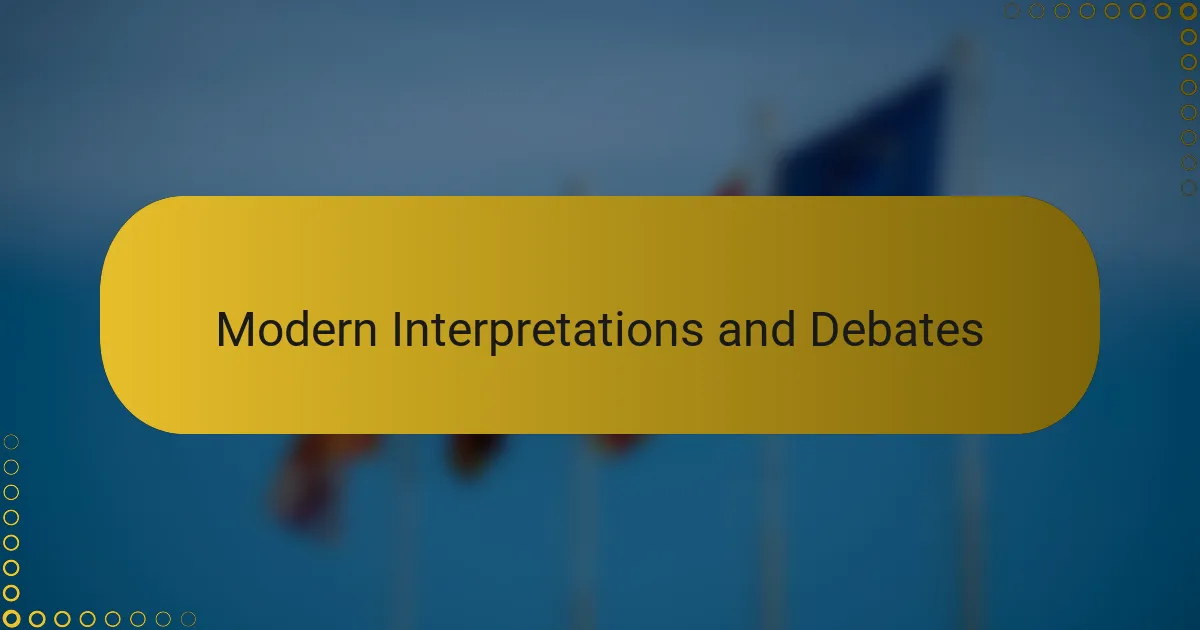
Modern Interpretations and Debates
When I consider modern interpretations of the Emancipation Proclamation, I’m struck by how it remains a subject of debate rather than unanimous praise. Some see it as a groundbreaking act of liberation, while others highlight its limitations and political motivations. Have you noticed how this tension reflects ongoing struggles with race and justice in America today?
In my experience, discussions around the Proclamation often reveal how history is never static. For example, I’ve heard people argue that it was more symbolic than practical at the time, while others insist it was a moral beacon that forever changed the country’s conscience. This back-and-forth makes me appreciate how historical documents can evolve in meaning depending on where—and when—we stand.
What really gets me thinking is how the Proclamation is used in debates about reparations, systemic racism, and equality in the present day. It’s almost like this 19th-century order still challenges us to confront uncomfortable truths. Doesn’t it amaze you that a single executive order can spark conversations that remain so crucial and unresolved over 150 years later?
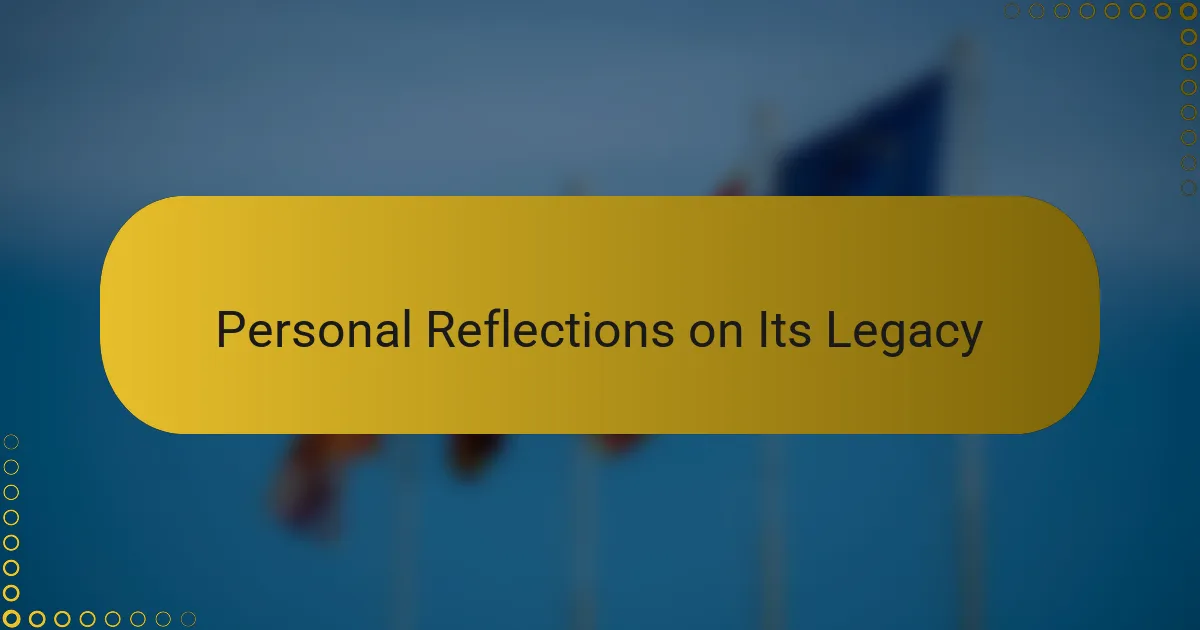
Personal Reflections on Its Legacy
Looking back on the legacy of the Emancipation Proclamation, I feel a deep sense of both hope and frustration. It opened a door toward freedom, yet the journey beyond that door was long and hard. Have you ever thought about how a document can symbolize liberation but also leave so many still chained by injustice? That paradox sticks with me.
Sometimes, I imagine the countless individuals whose lives were forever altered—some freed instantly, others waiting years for true equality. Their stories remind me that while history records grand gestures, real change happens in the lived experiences of people. It makes me wonder how many struggles remain invisible, even today.
I also reflect on how the Proclamation continues to inspire activism and dialogue. It’s a reminder that progress is never final, and the fight for justice demands ongoing commitment. Isn’t it powerful that a single executive order from the 1860s still challenges us personally and politically in the 21st century?
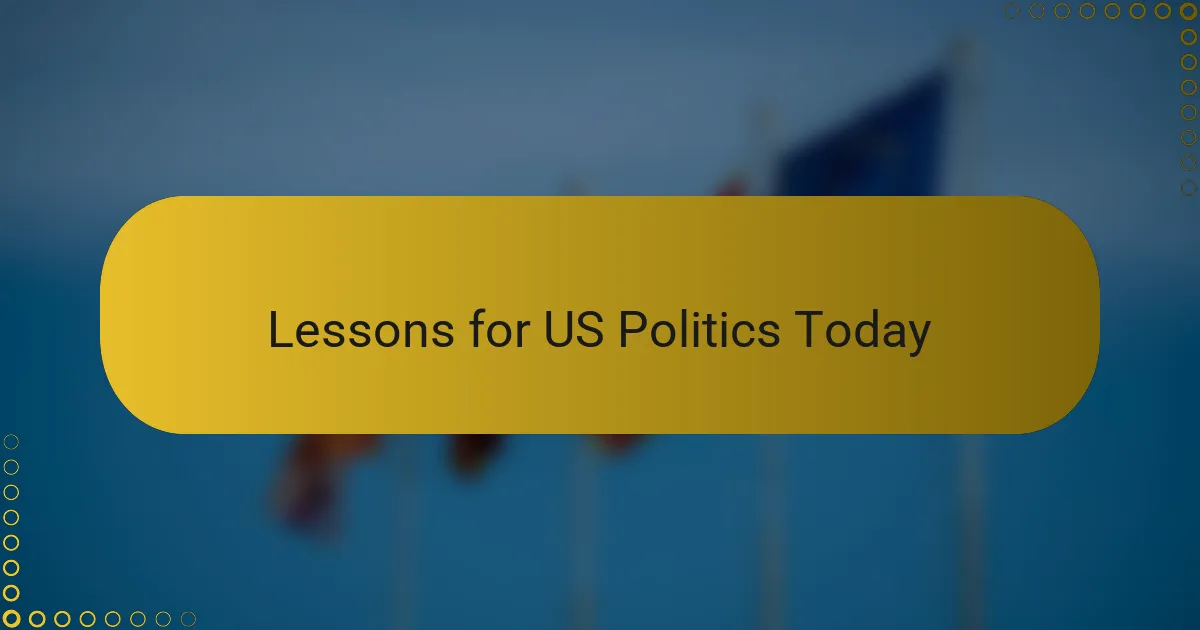
Lessons for US Politics Today
Thinking about lessons for US politics today, I keep coming back to the importance of moral courage backed by strategic thinking. The Emancipation Proclamation wasn’t just about ideals; it was about making bold choices even when the path was uncertain. Don’t we often need that kind of bravery now, when political gridlock can make progress feel impossible?
I also see how the Proclamation teaches us about the power of symbolism mixed with real policy. It showed that even imperfect actions can shift public consciousness and set the stage for deeper change. Have you noticed how leaders today sometimes hesitate to take symbolic stands, fearing controversy, when those stands could actually open doors for meaningful reform?
Lastly, the Emancipation Proclamation reminds me that political progress is often uneven and incomplete. It freed some slaves immediately but left many in [censured], highlighting the limitations of top-down solutions without continued commitment. Isn’t that a powerful warning for us now—progress requires persistence beyond any single declaration or policy?
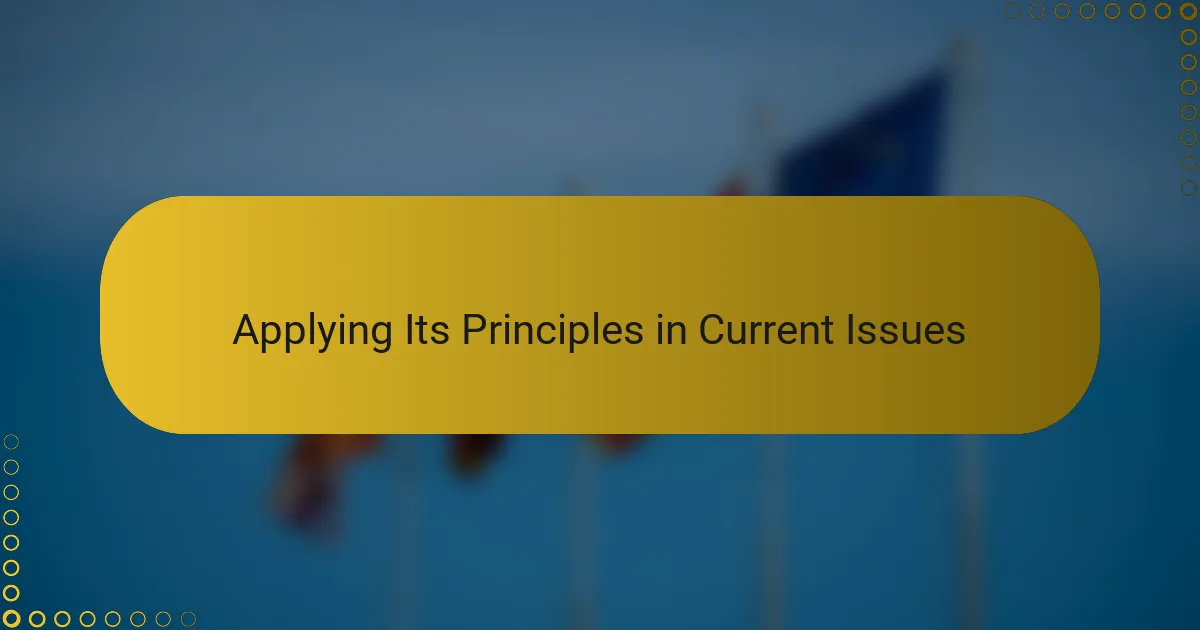
Applying Its Principles in Current Issues
Applying the principles of the Emancipation Proclamation to today’s issues feels both inspiring and sobering to me. It reminds me that declaring ideals like freedom and equality is crucial, but the real challenge lies in translating those declarations into meaningful, lasting change. Have you ever noticed how current debates on racial justice and criminal justice reform echo that same tension between bold rhetoric and practical impact?
I often think about how this document’s emphasis on liberty can guide us through modern struggles with systemic inequality. When policies fall short or fail to protect vulnerable communities, I’m reminded that emancipation was never just a legal act—it was a call to continually expand freedom for everyone. Doesn’t that make you wonder how we might better apply this mindset when tackling immigration rights, voting access, or economic disparities today?
From my perspective, the Emancipation Proclamation also teaches us about the power of timing and context in political action. Lincoln issued it during a war, leveraging a moment of crisis to push transformative change. I ask myself whether today’s leaders seize such moments with similar courage, especially amid crises like the pandemic or social unrest. Could embracing that blend of moral conviction and strategic urgency help us achieve progress now as it did then?